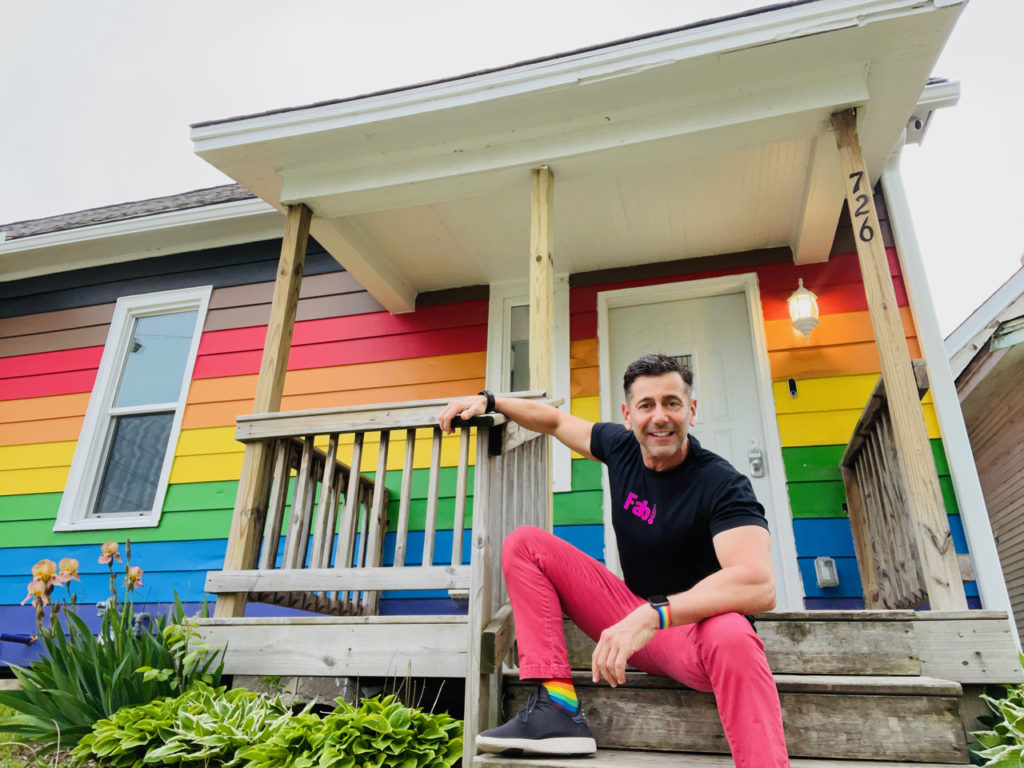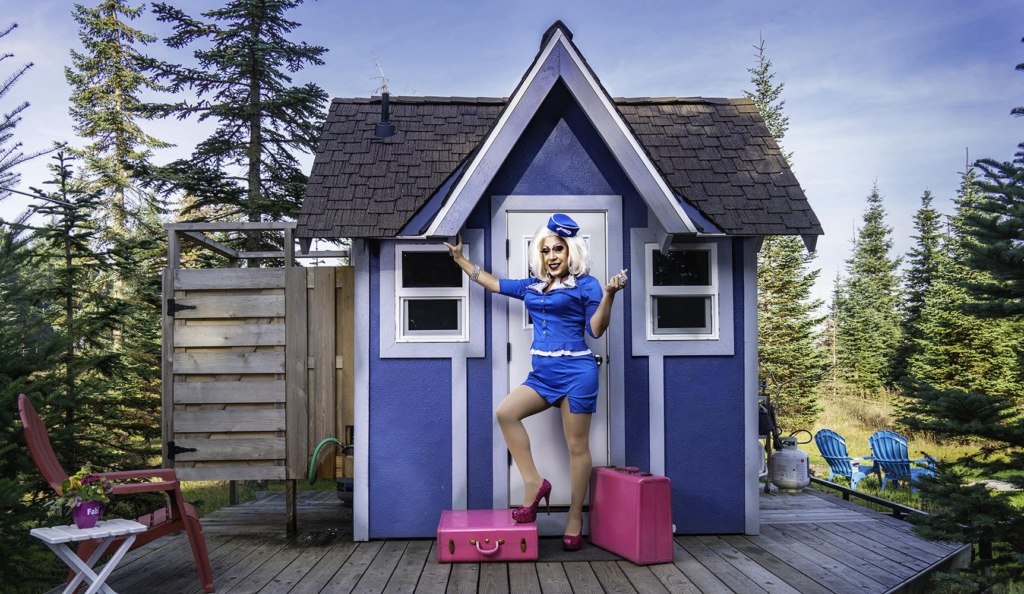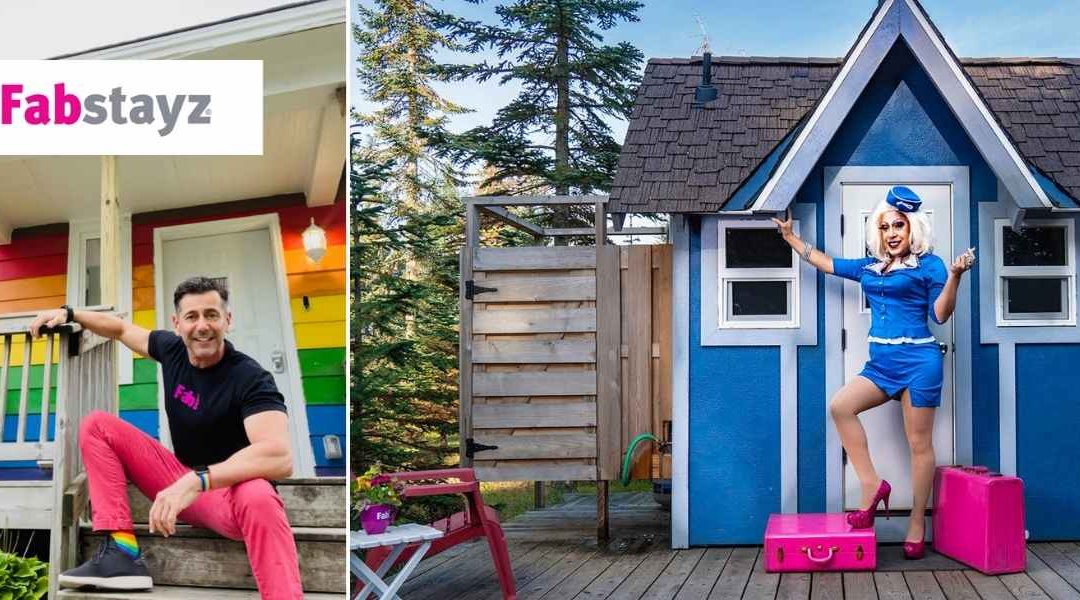Updated on May 6, 2023
Today, LGBTQ+ travel platform FabStayz announced the opening of pre-registration for its upcoming FabUniversity, an education and certification program for vacation rental operators to make their properties and hosting practices safe, inclusive, and welcoming to LGBTQ+ travelers. The virtual courses will cover everything from pronouns to marketing, and those who successfully complete it will be able to display a badge in their listings and marketing.
Hosts can now pre-register for FabUniversity at fabstayz.com/university.
Creating a travel community
In 2008, after having lost his corporate gig to the recession, Tampa resident Robert Geller set about making lemonade out of lemons.
“What do I want?” he asked himself. “I want a way to interact with the LGBTQ+ community outside of a bar. That’s what I want.”
The result: Outings and Adventures, an activities company for LGBTQ+ Tampeños to get together and explore things to do in the city, like cooking classes, glass blowing lessons, and stand-up paddleboarding.
Later, Outings and Adventures expanded to a full-service gay travel company in which Robert led excursions like windjammer tours and a “bike and barge” riverboat and bike tour through Europe. “It was all the things I wanted to do myself,” he said.
Becoming a short-term rental host
Around 2015, a friend shared with him how much fun she was having hosting guests in spare rooms in her home. Robert decided to try it, listing his main bedroom on Airbnb. While the extra income helped significantly as he bootstrapped Outings and Adventures, he also fell in love with hospitality.
One of his favorite guest experiences, he said, was hosting a woman from Germany who was working remotely from his house. They sat side by side at his kitchen pass-through, and when he would go to the refrigerator just on the other side of the counter, he’d joke, “Hey, I’m headin’ to the break room. You want anything?” They’d work in their pajamas, calling every day Casual Friday.
Many of his guests became fast friends. But with others, the usually benign get-to-know-you conversations were a little more precarious. Guests would ask, “What do you do for a living?” and the gay travel company owner would pause, running through multiple anxiety-ridden questions in his head at once. “What do I say? How do I answer it? They’re standing a foot and a half away from me, staying in my home for the next three nights,” Robert rattled off. “All of that was reliving my coming out right here in this moment, and it was every single time.”
He heard similar stories from other hosts. One in Australia shared that she had a male guest staying with a male friend, Robert said, putting air quotes around the word “friend.” She could tell they were a couple but were uncomfortable sharing that information with her. All she desperately wanted to do was invite them to a great gay bar down the street and other inclusive places around town to help them have a great trip, but she didn’t want to out them.

Coming out matters
These moments may seem small to those outside of the LGBTQ+ community, but they are significant. Robert realized that for LGBTQ+ guests and hosts, such interactions could make them feel as if they had to come out to someone they may not want to.
Coming out, or disclosing one’s identity to others, is not a single event, but rather a process relived with each new person met. Disclosing things like sexual orientation and gender identity can be freeing for some and scary, daunting, or dangerous for others. According to a Pew Research Center study, some LGBTQ+ adults have not and may never come out to their close family and friends, and only about half of working gay men and lesbians said all or most of the people they work closely with know that they are gay or lesbian.
As one respondent shared in the study:
“The most difficult part was acknowledging this in myself. Telling my best friend wasn’t too hard. I was nervous, even though he told me afterwards that he had known for a while. None of my other friends or family members know and I don’t plan on telling them unless absolutely necessary. I’m comfortable with myself, but am afraid of the reactions that I will receive should I divulge this information to those with whom I am closest.”
–Bisexual woman, age 20, first told someone at age 20
If you or someone you know would like guidance or resources about coming out, visit the Human Rights Campaign’s coming out resource center.
LGBTQ+ Travel
Travel can make this even more challenging. According to the World Tourism Organization’s 2017 Second Global Report on LGBT Tourism, 32% of LGBTQ travelers felt they were treated differently due to their sexuality when vacationing.
But hospitality providers that ignore LGBTQ+ inclusivity (intentionally or unintentionally) are missing a big opportunity. LGBTQ travel is a $218 billion travel niche, one that’s resilient to major disruptions and loyal to supportive brands.
When members of the LGBTQ+ community browse booking platforms, Robert said, they comb property descriptions and photos for indicators that a property might not be an inclusive space. Religious decor or scripture, for example, might prompt wariness. “From the outside, perception is reality, and that can be perceived in many different ways and perhaps maybe in the way it wasn’t intended,” Robert said.
He cited an example from another host that she received an inquiry from a traveler that simply said, “I’m trans.” The person perhaps didn’t want to invest in a conversation, Robert said, as they may have been shunned before.
So, Robert decided to build a better guest experience – a site that eliminates the guesswork of host profiles and listings, removes the anxiety of disclosure, and ensures every guest feels welcome in every home.
A new adventure for LGBTQ+ travelers
In 2018, he began testing ideas, surveying his Outings and Adventures database and building a simple site, for which one of the many URLs he had was Airbnb4LGBT.com. (Airbnb sent him a cease and desist letter within 30 days, a badge he wears proudly.)
In 2019, he launched FabStayz. Its mission: to provide a platform of truly inclusive and welcoming super host allies to the LGBTQ+ traveler.
“Queer. Trans. Lesbian. Gay. Bi. Bear. Femme. Only 1 label here…FABULOUS!” the site’s headline reads.
Today, FabStayz has 2,537 listings in 228 cities around the world, plus partnerships with LGBTQ+-friendly destination marketing organizations Visit Lauderdale and Travel Portland.

FabStayz is not a booking platform but rather a directory of inclusive listings on third-party platforms like Vrbo, Airbnb, and direct booking websites. Guests and hosts can message each other through FabStayz, but bookings are transacted off the site.
To list on FabStayz, approved FabHosts must meet the FabStandards and requirements:
- Take the FabStayz pledge: I welcome and encourage LGBT+Ally guests and individuals regardless of race, ethnicity, religion, sexual orientation or gender identity to be themselves with no anxiety or fear of judgment as I foster a hosting environment of respect and inclusivity.
- Minimum five months of hosting experience on a major platform such as Vrbo or Airbnb
- Great to excellent reviews
- Take an active role in supporting the FabStayz mission through their paid listings
(As of this article’s publication, however, the addition of new listings is on pause as they upgrade the platform to its next iteration, FabStayz 2.0, coming later this year.)
Inclusive travel certification
In 2022, FabStayz is taking its standards to a new level with the upcoming FabUniversity and a certification program to improve allyship as a host. Video modules will be led by members of the LGBTQ+ community and include content from FabStayz’s new partnership with Metro Inclusive Health, a Tampa-based 501(c)(3) organization that provides health and wellness services for the LGBTQ+ community as well as diversity, equity, and inclusion (DEI) training.
Before FabUniversity launches, there are still steps that hosts can take to make listings more inclusive. “You don’t have to cover your listing in rainbows,” Robert said in a DEI panel at the VRMA 2021 International Conference. “One of the best things you can do is include your pronouns.”
By including the pronouns you identify within your online profiles (she/her, in my case), it is a quick indicator that you respect others’ choice of pronouns, too, and a signal that your space is an inclusive one. Also, consider an inclusivity statement in your listing details similar to the FabStayz pledge.
Right now, Robert runs the company himself with five freelancers and FabAmbassadors. As an unofficial ambassador for the LGBTQ+ community, some days are harder than others, he said. Early on, he used to face a lot of negativity, especially on social media. And as the world returns to conferences, if it’s not an LGBTQ+ travel-specific event, he’s not always sure how he’ll be received.
“I still carry my own coming out experience, my own baggage,” he said. “I don’t know how I’m going to be welcomed. I’m the guy that’s wearing the pink pants with the black T-shirt and the pink logo on it. Not that I’m going to wear a boa and rainbows, but I’m going to be on brand and I know I’ll get looked at.”
What keeps him going is knowing he’s making a difference. It’s knowing that people like Tiffany in California who joined the platform early on could have peace of mind that her child, who is transgender, could travel and be safe, he said.
“Even though we’ll get beat up, even though we’re an underfunded startup, and even though something might not be working right… It’s those stories that remind us: this is why we do what we do.”
•••
GET UPDATES

